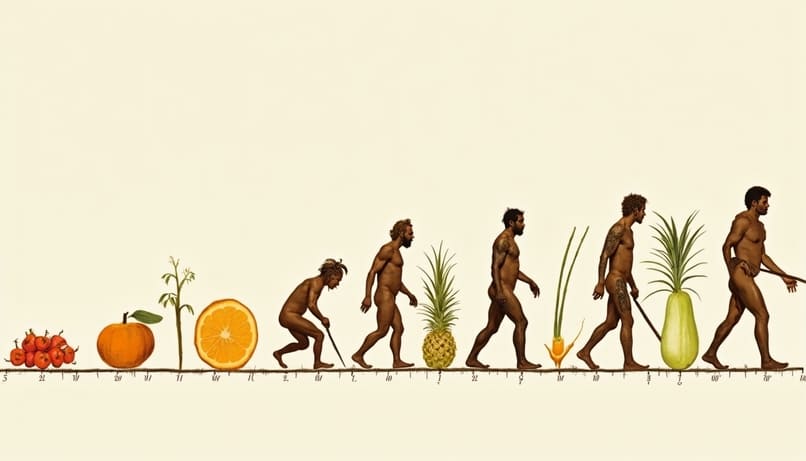A fascinating discovery is shaking up our understanding of human evolution. Contrary to the popular image of prehistoric man as a hunter, our distant ancestors were actually vegetarians. This revelation challenges many preconceived notions about our past and our food.
In this article, we will explore:
- The scientific evidence of this surprising discovery,
- The implications for our understanding of human evolution,
- How this information can influence our food choices today.
The study that changes everything
A groundbreaking study conducted by Max Planck Institute for Chemistry sheds new light on the dietary habits of our ancestors, the australopithecines, who lived about three million years ago.
The innovative technique for analyzing fossil teeth
To better understand the dietary habits of our Australopithecus ancestors, researchers from the "Max Planck Institute for Chemistry"have developed a revolutionary method based on" the analysis of calcium isotopes present in fossil teeth. Unlike traditional techniques that primarily focused on analyzing carbon isotopes to determine diet, this new approach offers increased accuracy.
The analysis of calcium isotopes allows for tracing the consumption of different types of foods., particularly those rich in calcium such as plants. Calcium isotopes reveal subtle details about the origin of ingested nutrients, as plants and animals do not exhibit the same isotopic signatures. This thus offers an unprecedented window into the dietary preferences of these hominids, shedding light on their diet. vegetarian Predominant.
This technique has several advantages. On one hand, it is less invasive and does not require destructive sampling of valuable fossils. On the other hand, It provides more reliable and detailed data, allowing for an accurate reconstruction of the diet of australopithecines. Thanks to this method, researchers were able to clarify a part of human dietary history, challenging some beliefs rooted in popular imagination, such as that of the hominid being primarily a hunter.
What the fossils from South Africa reveal
The fossils discovered in South Africa provide fascinating insights into the Eating habits australopithecines, our vegetarian ancestors. These specimens, three million years old, reveal a history etched in their teeth.
Isotopic analyses of fossilized teeth
Thanks to isotopic analysis, and more specifically the study of calcium isotopic ratios in dental enamel, scientists were able to determine that these hominids primarily fed on:
- Fruits
- Leaves
This diet is far removed from the stereotypical image of the prehistoric hunter, as our hunter-gatherer ancestors actually adopted a diet much more plant-based and diverse than one might think.
Study by the Max Planck Institute
The study conducted by Max Planck Institute of chemistry compared the calcium isotopes present in the fossilized teeth of australopithecines to those of other animal species from the same era. The results show that:
- Unlike other animals that incorporated more animal matter into their diet, australopithecines had isotopic profiles similar to those of modern great apes, which are primarily herbivorous.
Questioning preconceived notions
This discovery challenges the widely held idea of a diet dominated by hunting among early hominids. It also suggests that:
- The dietary adaptation of our ancestors was closely linked to the plant resources available in their environment.
Importance for evolution
By studying these fossils, we gain a better understanding of the evolution of human diet and the importance of plants in our history. This raises exciting questions about:
- The gradual transition to an omnivorous diet,
- The impact of environmental changes on the dietary choices of our ancestors.
For more details on this study, you can consult the full research from the Max Planck Institute for Chemistry. here.

The implications for our understanding of human evolution
The revelation that our ancestors, the australopithecines, had a primarily vegetarian diet profoundly challenges the long-accepted "hunter-gatherer" hypothesis.. This discovery prompts us to reconsider our view of human adaptation over time. Traditionally, human evolution has been perceived through the lens of a diet focused on hunting, symbolizing human survival and ingenuity in the face of environmental challenges. However, new isotopic data suggest that these early hominids were able to take advantage of the plant resources in their environment., challenging the idea that meat was at the core of their diet.
Adaptation to a changing environment
The study of our ancestors' diets offers us a fascinating window into their ability to adapt to environmental challenges. At a time when climatic conditions could vary significantly, australopithecines demonstrated remarkable dietary flexibility by maximizing the available resources in their ecosystem. These often abrupt climatic changes transformed their habitat, prompting them to adapt by incorporating various plants into their diet.
As the African savannas evolved, the australopithecines faced fluctuations in food resources. This ecological pressure may have encouraged a gradual transition towards a more diversified diet, including the occasional introduction of animal-based foods. However, the predominance of theplant-based diet suggests a remarkable resilience and an ability to thrive primarily thanks to the available plants.
This dietary adaptation likely played a crucial role in their survival by allowing them to take advantage of the nutritional qualities of plants and plant-based foods, while minimizing dependence on uncertain and potentially dangerous food sources like meat. By reflecting on this adaptation strategy, we can see how the dietary choices of our ancestors can shed light on our own modern eating practices, especially in the context of current environmental changes.
The benefits of a plant-based diet for our ancestors
The plant-based diet of our australopithecine ancestors offers several nutritional advantages that likely contributed to their survival and development. These hominids had access to an abundance of fruits, leaves, and other plants. rich in fiber, vitamins, and essential minerals. These nutrients play a crucial role in strengthening the immune system and maintaining a good health General, fundamental elements for survival in a hostile environment.
Fruits and leaves, the main components of their diet, are naturally rich in antioxidants, which protect cells from oxidative stress and promote better cardiovascular health. Additionally, these foods provide a source ofEnergy Easily accessible, thanks to their high content of natural carbohydrates. Regular consumption of plants may also have contributed to the digestive well-being of our ancestors, thanks to the intake of fibers that promote a digestion healthy and regular.
In terms of ecological impact, the plant-based diet of these early hominids was sustainable and respectful of natural resources. Unlike hunting, which requires more resources and can destabilize ecosystems, the consumption of plants is part of a more balanced and environmentally friendly food chain. By observing the diet of our ancestors, we can find parallels with current trends towards mindful eating, which values sustainability and health.
This vision of our dietary past encourages us to reconsider the Benefits of a plant-rich diet, not only for our health personal, but also for our global impact on the planet. By incorporating more fruits and vegetables into our daily diet, we can not only honor our ancestors but also contribute to a more sustainable and healthier future.

What does this discovery mean for our diet today ?
The revelation that our ancestors, the australopithecines, were primarily vegetarians strangely resonates with current dietary trends. Today, more and more people are turning towards a plant-based diet, inspired by a growing awareness of the health benefits, as well as by environmental concerns. This convergence between the past and the present prompts us to reconsider the importance of plants in our daily diet.
Lessons to be learned from our vegetarian ancestors
The study of our ancestors' vegetarian diet provides valuable insight into the benefits of a diet rich in fruits and vegetables in our daily lives. By incorporating more plant-based foods into our diet, we can not only improve our health but also contribute to the preservation of our environment. Here are some practical tips to enrich your diet with plant-based foods:
- Vary the colors on your plate: Each color of fruit and vegetable offers a unique spectrum of nutrients. Incorporate a variety of colorful foods to maximize nutritional benefits.
- Opt for seasonal foods: Seasonal fruits and vegetables not only taste better, but they are also often richer in nutrients. Additionally, choosing local produce reduces the carbon footprint.
- Incorporate raw foods: Integrate some raw foods in your daily diet can help preserve the enzymes and essential nutrients, inspired by the ancestral practice of unprocessed eating.
- Explore legumes and seeds: Rich in fiber and protein, legumes and seeds are an excellent addition to a plant-based diet, adding variety and nutrition.
By drawing inspiration from the dietary habits of our ancestors, we can reconsider our approach to modern eating. Plants, an integral part of their diet, remind us of the importance of returning to simpler and more natural eating practices.
Living food: a return to the roots ?
Living food constitutes a culinary approach that celebrates the benefits of unprocessed foods and entirely raw, allowing for the preservation of their essential nutrients. This lifestyle directly reconnects us to the dietary practices of our ancestors, the australopithecines, who favored a primarily plant-based consumption. By refusing the cooking, theliving food aims to maximize the intake of vitamins, minerals, and enzymes, fundamental elements for overall well-being.
This return to basics is not limited to a simple diet; it is a commitment towards a healthier and more environmentally friendly life. By incorporating fruits, vegetables, nuts, and seeds in their purest form, one adheres to a lifestyle that honors the principles of organic and sustainable agriculture. This method also encourages a greater awareness of the products we consume and their impacts, both on our health and on the planet.
Opt for a living food, it is also to be inspired by the natural preservation methods and minimize the ecological footprint of our consumption. This dietary philosophy invites us to rethink our relationship with food by adopting habits that not only improve our health but also honor the vegetarian heritage of our ancestors. By revisiting these ancient practices, we have the opportunity to adopt a more harmonious and balanced lifestyle, in line with our modern values of well-being and sustainability.

Conclusion
This groundbreaking study on australopithecines reshapes our understanding of human dietary evolution. The analysis of the isotopic composition of fossil teeth highlights a predominantly vegetarian diet, challenging the stereotypes associated with the primitive hunter. This discovery encourages us to reexamine the benefits of a plant-based diet, in line with current trends that value health and sustainability. By incorporating more plant-based foods into our modern diet, we can not only improve our personal well-being but also reduce our ecological footprint. For those who wish to further explore living foods, it is advisable to seek information through reliable resources, engaged communities, and by subscribing to our newsletter can be a rewarding first step.
Your questions and our answers (FAQ)
Were our ancestors really vegetarians, and why does this challenge preconceived notions about their diet?
Yes, recent scientific evidence indicates that our ancestors, the australopithecines, had a primarily vegetarian diet. The study conducted by the Max Planck Institute revealed through the analysis of calcium isotopes in fossil teeth that they mainly consumed fruits and leaves. This challenges the popular belief that these early hominids were primarily hunters.
What is the method used to determine the diet of australopithecines and how is it innovative?
The researchers used an innovative technique of analyzing calcium isotopes present in fossil teeth, an approach that provides better precision compared to techniques based on carbon isotopes. This method allows for tracing the consumption of calcium-rich plants, thus offering a clearer understanding of the diet of our ancestors.
Why is the discovery that australopithecines were vegetarians important for our understanding of human evolution?
This discovery is crucial because it challenges the central idea of the "hunter-gatherer" in our understanding of human evolution. It suggests that our ancestors were more flexible and adaptive, maximizing the available plant resources. This offers us a new perspective on the evolution of human diet and our ability to adapt to changing environments.
How does this discovery influence our modern food choices?
The realization that our ancestors were primarily vegetarians resonates with current trends towards a more plant-based diet. This encourages us to place greater value on fruits, vegetables, and other plants in our diet, not only for health reasons but also to reduce our ecological footprint, drawing inspiration from a sustainability model that respects the environment.
What nutritional benefits did our ancestors derive from a primarily vegetarian diet?
The diet rich in fruits and leaves provided essential vitamins, minerals, fibers, and antioxidants, supporting their physical and cognitive development. These nutrients strengthened the immune system and promoted overall health. The limited ecological impact of this diet also serves as a model of sustainability.
What lessons can we learn from the dietary practices of our ancestors?
By drawing inspiration from the vegetarian diet of our ancestors, we can incorporate more plant-based foods into our modern diet to improve our health and reduce our environmental impact. This includes varying the colors of fruits and vegetables, consuming seasonal products, and incorporating raw foods, legumes, and seeds into our diet.
Is a raw food diet a return to the roots for our modern diet?
Yes, the raw food diet, which advocates the consumption of raw and organic products, reflects the dietary practices of our ancestors. This approach maximizes nutritional benefits while minimizing ecological impact. It encourages a healthier and more sustainable life, in harmony with our vegetarian food heritage.













